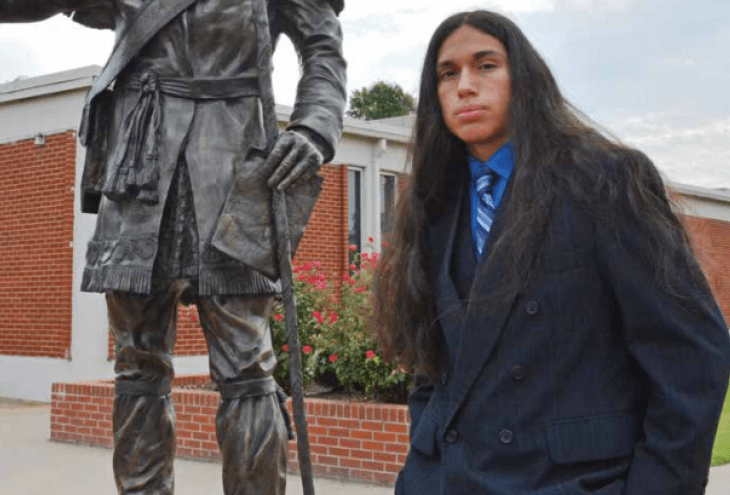When Onen Rhoades wants something, he isn’t afraid to work hard for it. For years he had been interested in building computers but lacked the resources. Still, Rhoades didn’t let that stop him. Once he was old enough to get a job, he began saving money to buy components. By the time he was 16, he had earned enough to build his first computer. “It started when I wanted a gaming computer,” he recalls. “Since there weren’t any classes on it, I went about teaching myself how to build a computer, and I eventually became really good at it.”
Now a high school senior, Rhoades lives in Park Hill, Okla., with his mother and sister. He is an enrolled member of the Cherokee Nation and Nez Perce Tribe, and his family background includes Seneca and Delaware ancestors as well. His Native American heritage has played an integral role in his upbringing. “My mother is very traditional,” he says. “She used to read to me the teachings of Dekanawita every night when I was young.”
Rhoades attended Cherokee Camp as a child, where he enjoyed the language and history classes, and his high school experience has strengthened ties to his heritage. “The high school I go to, Sequoyah High, is operated by the Cherokee Nation,” he explains. The Cherokee Nation assumed the school’s operation from the Bureau of Indian Affairs in 1985.
In his spare time, Rhoades takes an active role in his community. He attends local events celebrating Native culture, often sings and drums at powwows, and volunteers at events hosted by the Tulsa Indian Club. Rhoades has also been an active member of AISES and participated in NAIVSEF (the National American Indian Virtual Science and Engineering Fair) when he was in the seventh, eighth, and ninth grades. For one of his projects, he used mirrors to build a hologram projector. Another involved using sand to create an affordable filtration system. He has competed in VEX Robotics and the First Robotics Competition through AISES, and provides robotics demonstrations to visiting eighth graders.
Rhoades has been interested in STEM-related fields since he was a small child. “When I was little, I really liked dinosaurs and wanted to be a paleontologist,” he says. “But then I realized how much I hate dust.” Today it seems clear that Rhoades’ true calling is computer engineering.
His fascination with computers is obvious from the way he talks about them. “I look at a computer like a living, breathing organism. Like you, or me, or squirrels,” Rhoades explains. “It needs all the right pieces. You have to put it together just right, and when you do and it works, it’s very satisfying.”
If you were to ask Rhoades what first sparked his interest in computer engineering, his reply might surprise you. He is a huge fan of Dr. Who, a popular science-fiction television series. The TARDIS, a time- and space-traveling machine that plays a central role in the show, fired his imagination. When he first saw the show, Rhoades viewed the TARDIS as a living being, much as he does a computer.
“Whenever I’m putting together a computer, I almost think of it as being a TARDIS. It kind of is, in a sense, because I put together gaming computers,” he says. “When I play a game that has a certain setting, like ‘Assassin’s Creed 2’ — it’s in Renaissance Italy — I think of it like, ‘Hey, I just got in my TARDIS and went to Renaissance Italy.’”
It should come as no surprise that Rhoades intends to major in computer engineering when the time comes for him to go to college. He plans to apply to Dartmouth, Oklahoma State University, and Arkansas State University, but the University of Pennsylvania is his dream school. “They have a good IT program,” he says, “and it’s very close to my granddad, who lives in Pennsylvania.”
After graduating from college, this hardworking young man would like to use his computer engineering skills to help people. Rhoades plans to eventually have a career in computer repair or IT services, areas where he has already gained experience working in Northeastern State University’s IT department over the past two summers. “I find it very satisfying when you can go and help someone — like a student who’s been locked out of email — and you fix it,” he says. “It just feels really good.”














